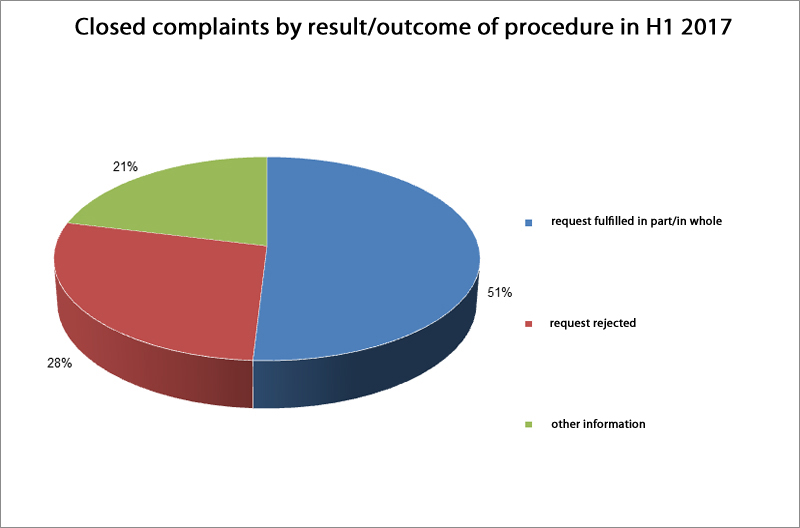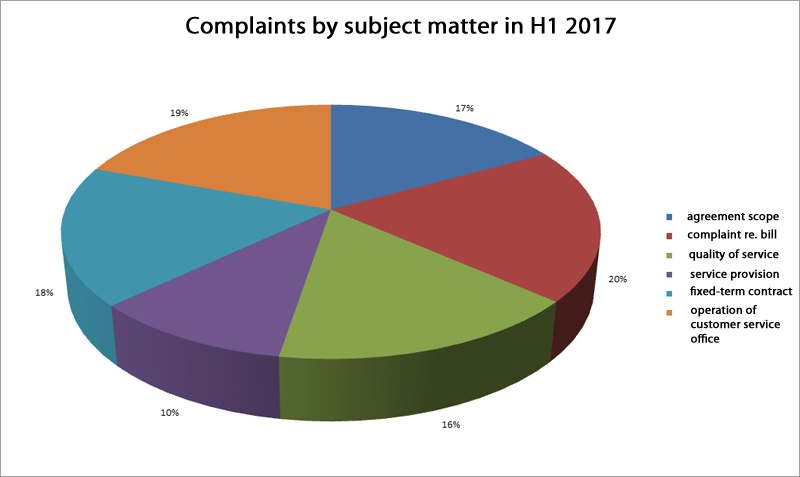Report on complaint proceedings by the Commissioner for Media and Communications H1 2017
The practice and the findings of the Office of the Commissioner for Media and Communications regarding complaint proceedings in H1 2017
The Commissioner for Media and Communications works towards promoting the justified interests of users of electronic communications services and media content services in the course of their usage of these services.
Pursuant to Act CLXXXV of 2010 on Media Services and Mass Media (hereinafter: Media Act), the Commissioner acts upon complaints received by its Office regarding harm to interests or a direct threat of such harm.
I. COMPLAINTS ABOUT ELECTRONIC COMMUNICATIONS SERVICES
If the complaint received is thorough and falls within her competence, the Commissioner contacts the relevant electronic telecommunications provider. If she believes that the action taken by the service provider or its proposal for the resolution of the complaint is not sufficiently equitable or if the service provider refuses, without sufficient reason, to grant the request, the Commissioner may demand special equity in the case. If necessary, she may conduct a conciliation process involving the complainant or, if the matter concerns a large number of consumers, the representative of the consumer interest protection body.
Results and findings from complaint procedures in H1 2017
In the first half of 2017 the Commissioner’s Office received a total of 280 complaints about communications. The Office conducts its proceedings with communications service providers electronically (via the Ügyfélkapu site), in compliance with the Act on Electronic Administration.
The number of complaints has fallen by 15% year-on-year, which may also suggest greater awareness among consumers as they conduct their transactions.
In 137 instances, the service providers granted the complainants’ requests in part or in full. They paid compensation for a total of approximately HUF 6,000,000, doing so either by crediting an amount or waiving the liquidated damages payable to the provider; in a number of cases, they granted significant discounts or more attractive conditions for the future (instalment payment discounts, improved service quality, switch to lower-tariff plan).
In 25 cases, no proceedings were brought because the case was outside the Commissioner’s competence, proved unfounded, was revoked by the complainant or missing information was not supplied in time.
The complaints concerned mostly the inappropriate application of the terms and conditions of the subscriber agreement, the relocation of service provision and the quality of services. The operation of service providers’ customer service functions was once more the subject of a large number of complaints, which objected to a failure to act or to provide adequate information.
The Office continue to receive a high number of equity requests, mostly regarding the termination of loyalty-period contracts and tariff plan switches.
There were numerous complaints about the invoicing practices of a service provider with significant market share and about several providers regarding their number portability and service relocation practices.
Many complained that they were given premium-rate services they had not requested or that they were not given the content ordered even though they had requested and been invoiced for it. Several complaints objected to the amount of fees for content services or the failure to provide preliminary information and highlight certain matters.
There were numerous complaints regarding the data reconciliation of mobile phone numbers with prepaid SIM cards, which had a due date of 30 June 2017; most of these complaints concerned deficiencies at providers’ customer service functions.
On NMHH-MHB’s revamped website, the Commissioner’s Office published information about number portability on 24 March and about the relocation of services on 17 April.
- http://nmhh.hu/cikk/187387/Tudnivalok_a_vezetekes_telefon_internet_es_televizios_szolgaltatas_athelyezeserol
- http://nmhh.hu/cikk/173618/Tudnivalok_a_szamhordozasrol__kulon_figyelemmel_a_husegidos_szerzodesekre
The diagrams below capture the breakdown of complaints in H1 2017 in terms of the outcomes and results of complaint procedures and the subject matters of complaints.


II. COMPLAINTS ON MEDIA CONTENT SERVICES
Pursuant to the Media Act, the Commissioner promotes the enforcement of media content service users’ equitable interests applicable to the use of media content services as and when these may be jeopardized due to the behaviour of service providers.
Proceedings may be brought and conciliation with professional, advocacy or self-regulatory bodies of media content providers may take place if the complaint concerns activities by media content providers resulting in harm to the interests of a considerable proportion of viewers, listeners or readers or if it is reported against a single provider on several occasions or against several providers.
Complaints on media subjects were three times higher than in the same period in 2016 and accounted for 6% of all complaints. Nearly two thirds of the complaints concerned the content of radio broadcasts, one complaint concerned the content of a printed press product, three reported online content, and a further two complaints concerned television programs and advertising content.
No proceedings were brought regarding these media complaints as the relevant preconditions were missing.